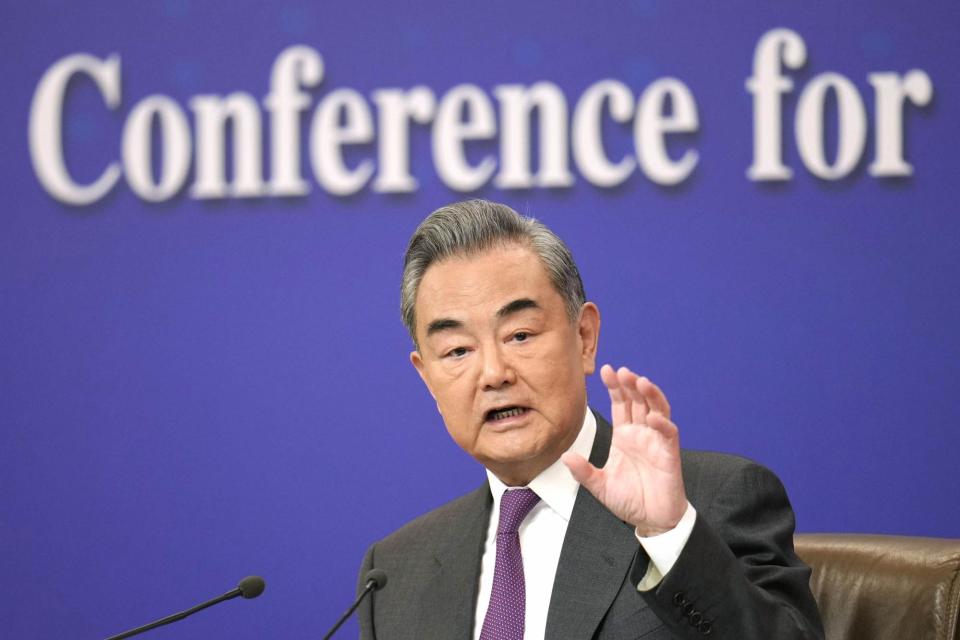China 'plays to unifying theme among Global South': it's not America
China has again sought to portray itself as a responsible world power in its rivalry with the United States, and pledged to champion the Global South.
The latest effort came from top diplomat Wang Yi during a carefully choreographed press conference on the sidelines of the National People's Congress on Thursday.
He said Beijing's diplomatic priorities this year were to "maintain stable relations with major powers, join hands with its neighbouring countries for progress, and strive for revitalisation with the Global South".
Do you have questions about the biggest topics and trends from around the world? Get the answers with SCMP Knowledge, our new platform of curated content with explainers, FAQs, analyses and infographics brought to you by our award-winning team.
"China will strive to provide more Chinese solutions to both regional hotspots and global issues, creating new opportunities for the world with its own development," he said.
Wang addressed a wide range of issues, mostly concerning relations with major powers, but observers said a key message was how China sees its future role in a world increasingly dominated by its rivalry with the US.
The foreign minister said certain powers should not monopolise international affairs and countries should not be categorised according to their so-called strength. He said China was for an "equal and orderly" multipolar world and inclusive economic globalisation that benefits all.
"It is impermissible that those with the bigger fist have the final say, and it is definitely unacceptable that certain countries must be at the table while others can only be on the menu," he said.
That appeared to be a direct response to US Secretary of State Antony Blinken's remarks last month that "if you're not at the table in the international system, you're going to be on the menu".
Despite China's economic woes, Wang also reiterated Beijing's promise to promote "high-quality" belt and road cooperation, which he described as "an engine for the common development of all countries and an accelerator for the modernisation of the whole world".
Wang's remarks echoed the line from the closed-door Central Conference on Foreign Affairs Work late last year that China faced "strategic opportunities" to raise its "international influence, appeal and power" despite "high winds and choppy waters".
"In the face of complex turmoil in the international environment, China will persist in being a force for peace, a force for stability and a force for progress in the world," Wang said.
George Magnus, a research associate at Oxford University's China Centre, said Wang's remarks during the televised presser drew attention to the rising tension over global governance between China and the US.
Beijing's narrative war with Washington also laid bare "the reach that both superpowers have, or lack, in the so-called Global South, which is not the uniform, one-size template for global developing and middle-income nations often portrayed," he said.
"For the time being though, China is playing to the one unifying theme among Global South countries, which is that it is not America. And it's clear that many - by no means all - countries are unhappy with or uncertain about the US in the global system, especially ahead of the November elections and in view of the churn in American politics."

Foreign Minister Wang Yi said it was "impermissible that those with the bigger fist have the final say". Photo: Kyodo alt=Foreign Minister Wang Yi said it was "impermissible that those with the bigger fist have the final say". Photo: Kyodo>
Wang Wen, executive dean of the Chongyang Institute for Financial Studies at Renmin University of China, said US-led containment and interference remained the biggest challenge for the country's rise.
"Even so, [it is clear that] China still has the confidence to overcome external challenges and contribute diplomatically to the realisation of national rejuvenation," he said.
Describing the world as being stuck in the most chaotic stage since World War II, he said it was a fact that "China is a force for peace, stability and development in the world".
"No one can deny that in the past 40 years, China has been the only major economy in the world that has not launched or participated in wars," he said.
But Pang Zhongying, an expert on international affairs from Sichuan University, said although Wang's messaging was clearly aimed at countering the US-led West, key questions remained unanswered.
"We still don't know how China plans to deliver those ambitious diplomatic goals given the economic turmoil at home and how it plans to cope with the possibility of [former US president] Donald Trump's second term," he said.
Shen Dingli, a Shanghai-based international relations scholar, said Beijing should be careful when it talks about ambitions to be a leader of the Global South as it could fuel suspicion from other emerging powers.
He also said China's efforts to style itself as an alternative to the US would be seen by some - especially the China hawks in the West - as an attempt to challenge or displace Washington in the existing world order.
Magnus agreed, noting that despite Beijing's talking points about a multipolar world, it may find it hard to live with other powers that do not share China's national interests and narratives.
"An India that was more aligned with the US, for example, could not fit into China's orbit well. Multipolarity for China is a system in which China's governance system was central," he said.
This article originally appeared in the South China Morning Post (SCMP), the most authoritative voice reporting on China and Asia for more than a century. For more SCMP stories, please explore the SCMP app or visit the SCMP's Facebook and Twitter pages. Copyright © 2024 South China Morning Post Publishers Ltd. All rights reserved.
Copyright (c) 2024. South China Morning Post Publishers Ltd. All rights reserved.
